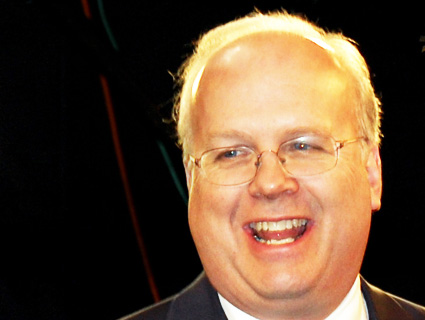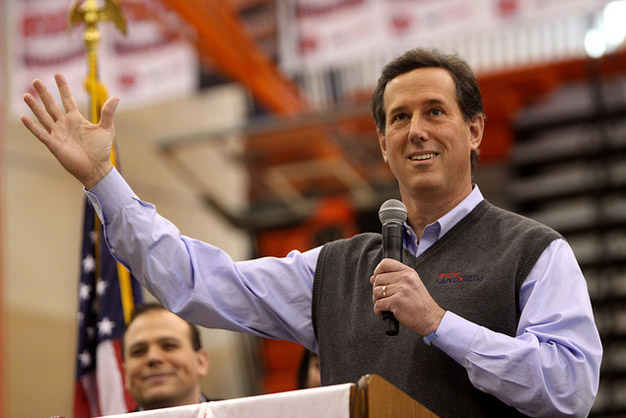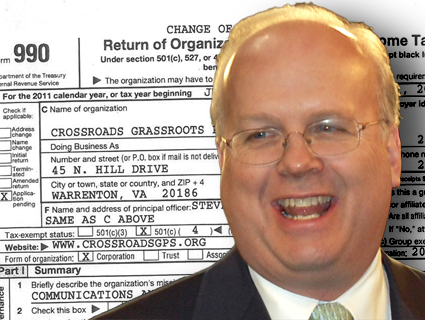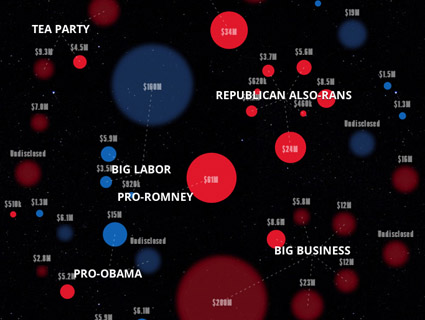This year, powerful dark-money political groups have spent tens of millions of dollars in battleground states hammering President Obama on jobs, taxes, health care, gas prices, and more. Reformers rail against these shadowy nonprofits—including Crossroads GPS, cofounded by GOP guru Karl Rove, and the Koch-backed Americans for Prosperity—for hiding their donors’ identities. But what’s gone largely unnoticed is how these outfits have danced around federal election law to obscure their ad spending from public view.
Michigan is one battleground state where this dark-money dynamic is playing out. According to broadcast records analyzed by the Michigan Campaign Finance Network, conservative nonprofit groups dropped nearly $6 million on TV ads dinging Obama between January 1 and June 30. However, as MCFN’s Rich Robinson points out, these nonprofits crafted their ad blitzes so that they avoided disclosing basic details about their on-air attack campaigns—like how much they spent, when and where they spent it, which media consultants they used, and what candidate the ads discussed.
Here’s some background on how this works. Any ad that mentions a candidate by name and runs within 30 days of a primary or 60 days of a general election is called an “electioneering communication.” (In election years like 2012, there’s also a 30-day window before national party conventions, too.) And this type of ad doesn’t tell viewers how to vote; instead, it ends with an exhortation, such as “Tell President Obama to stop out-of-control government spending.” Federal law says that any group running an electioneering communication must immediately disclose its spending with the Federal Election Commission, which posts the information online. On the FEC’s website, a nonprofit’s ad-buy information—how much it is spending and, importantly, where it is broadcasting its ads—is a click away.
However, Robinson says that nonprofits running anti-Obama ads in Michigan have taken steps to dodge disclosing such details. On January 16, Americans for Prosperity launched a 10-day ad campaign in Michigan’s five largest media markets—Detroit, Grand Rapids-Kalamazoo, Lansing, Flint, and Traverse City-Alpena. Yet 31 days before Michigan’s February 28 presidential primary, AFP yanked its ads—and, thus, avoided the window compelling disclosure.
In fact, no nonprofit group ran ads in Michigan during the 30-day window before the GOP presidential primary, according to Robinson. But the day after the primary, with the disclosure window now closed, the dark-money barrage began anew.
The American Future Fund, a conservative nonprofit that in 2010 received nearly $10 million from a mysterious group reportedly funded by the Koch brothers’ donor network, launched an ad blitz the first day after Michigan’s primary. AFF’s ad portrayed Obama as too cozy with Wall Street and too eager to pocket the Street’s campaign cash. AFF would go on to spend $1.2 million on anti-Obama ads throughout the spring in every major media market in Michigan. But at the time, it didn’t have to detail the true extent of its spending.
With the disclosure window in the rearview, other conservative nonprofits, including Rove’s Crossroads GPS and the Koch-linked American Energy Alliance, ramped up their Obama assault in Michigan, according to Robinson’s analysis. An AEA ad blamed Obama’s “failed energy policies” for doubling gas prices at the pump—a claim PolitiFact has debunked. And from mid-May to mid-June, Crossroads GPS soaked the airwaves across the state with 30- and 60-second ads saying Obama left underwater homeowners stranded without help (PolitiFact: “Mostly True”), jacked up middle-class taxes (“Mostly False”), and failed to halve the federal deficit in his first term (“True”).
By avoiding disclosure, the size, location, and timing of this spending remained a mystery. But in June, Robinson hand-tallied broadcast records he collected from TV stations across Michigan and pieced together the full picture of nonprofit spending. It’s true that most of these groups announce their national ad campaigns on their websites, but campaign finance reform advocates say that’s far from enough. “Who knows if they put out a press release every time they do an ad buy?” says Paul S. Ryan, an attorney at the pro-reform Campaign Legal Center. “The public should get more information.” (Officials with the American Future Fund, Americans for Prosperity, Crossroads GPS, and the 60-Plus Association, which also ran ads in Michigan, did not respond to requests for comment. A spokesman for the American Energy Alliance said his organization did not take into account the electioneering communication laws when buying ads.)
It’s almost impossible to know if nonprofits dodge spending disclosure outside of Michigan. Few states have full-time watchdogs like MCFN’s Robinson to track nonprofit political spending.
The $6 million pummeling of Obama in Michigan has taken quite a toll, especially since no pro-Obama nonprofit or super-PAC has punched back. In mid-February, Obama led Romney by 16 percentage points in a survey by the left-leaning Public Policy Polling shop, and by 18 points in an NBC News/Marist poll. By late June, Romney had shrunk Obama’s lead to just 4 points, according to a June 24-25 NBC News/Marist poll. RealClearPolitics‘ polling average for Michigan puts the president ahead by just 1.8 points. In 2008 Obama won the state by 16 percentage points. “The negative ads are hurting him among independent voters,” Bernie Porn, who runs the EPIC-MRA polling firm in Lansing, Michigan, told MLive.com in June.
There’s nothing illegal about nonprofits avoiding basic forms of disclosure in their anti-Obama blitzkrieg. But Robinson, the Michigan campaign finance expert, says these groups do a disservice to the public by making it harder to see the true extent of the ad wars in a given state or campaign. Few people, he notes, have the time to piece together reams of broadcasters’ advertising records to tally up the big cash in their states. Much of the 2012 campaign, Robinson adds, is taking place in the shadows. “The electorate is getting sucker-punched,” he says.

















